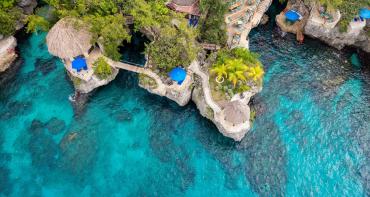A vulnerability resilience framework, newly revised and expanded by the Commonwealth, helps small states to develop policies to build resilience and bounce back from economic and environmental crises.

A vulnerability resilience framework, newly revised and expanded by the Commonwealth, is set to help small states around the globe to build resilience and bounce back from economic and environmental crises.
The framework, first developed in 2004 with the University of Malta, has now been updated to help countries better measure their susceptibility to shocks, including financial crises and extreme weather events, and develop targeted national policies in response.
President James Michel of Seychelles, Foreign Minister Arvin Boolell of Mauritius and Minister James Fletcher of Saint Lucia, were among the speakers at the unveiling of the revised framework at a joint high-level event with the UN Department of Economic and Social Affairs in Samoa on 2 September 2014.
Audio: Minister James Fletcher of Saint Lucia
Kamalesh Sharma, Commonwealth Secretary-General, who co-chaired the event in Apia with Wu Hongbo, UN Under-Secretary-General for Economic and Social Affairs, underscored that small island developing states are a “priority concern for the Commonwealth”.
The event, held during the International Conference for Small Island Developing States (SIDS 2014), also featured a presentation of UN DESA’s vulnerability resilience profiles, which enable countries to identify key vulnerability risk factors.
“Together we strive to lift performance and sustainability, and to raise ambition levels higher,” Mr Sharma told the packed audience of delegates from governments, civil society and business. “Through sustained advocacy, and in many practical ways, we have sought to advance international policies, mechanisms and rules that are more responsive to the specific development needs of SIDS.”
The newly expanded Commonwealth vulnerability resilience framework captures the downsides of an unregulated or badly regulated market, environmental management, governance, social development and social cohesion factors, which are critical contributors to economic resilience.
President Michel of Seychelles welcomed the efforts of the Commonwealth, UN DESA and EU to develop tools to identify and respond to the vulnerability of small island developing states. “So far our development efforts have treated symptoms, but not causes of economic health, or lack of sustainability in general. For SIDS, we have failed to recognise the core factors that underpin our vulnerability,” he said.
“We are vulnerable, yes, we face unique challenges, but we are far from weak. We are prepared to be innovative in addressing our development challenges. We are able to act fast and bring real improvements to the lives of our populations, if we are given the right tools to do so.”
Video: Foreign Minister Arvin Boolell of Mauritius
Foreign Minister Arvin Boolell of Mauritius added: “We have been given a toolkit which will enable us to strengthen our case as small island developing states, to speak more forcefully and to convey our message loud and clear."
Of the world’s 39 small island developing states, 25 are members of the Commonwealth. ĚÇĐÄĚ˝»¨ has worked to advance the sustainable development of these countries for over four decades.
Mr Wu described the development of the vulnerability resilience approach as a “very important milestone” which will help countries to build resilience. “Strengthening the resilience of SIDS is one area where combined expertise can produce positive results," he said.
“Weather phenomena are inevitable, but they do not have to become disasters if we have the means to adapt to their occurrences. Likewise, the ebbs and the flows of the international trading system should not have to disrupt the way of life of islands,” Mr Wu added.
The vulnerability resilience framework is detailed in the handbook, Building the Resilience of Small States: A Revised Framework,
Video: President James Michel of Seychelles


